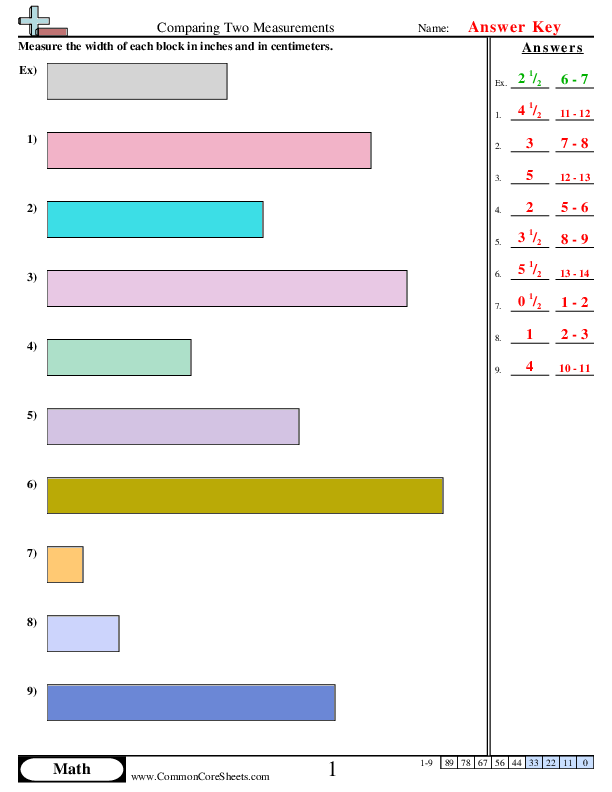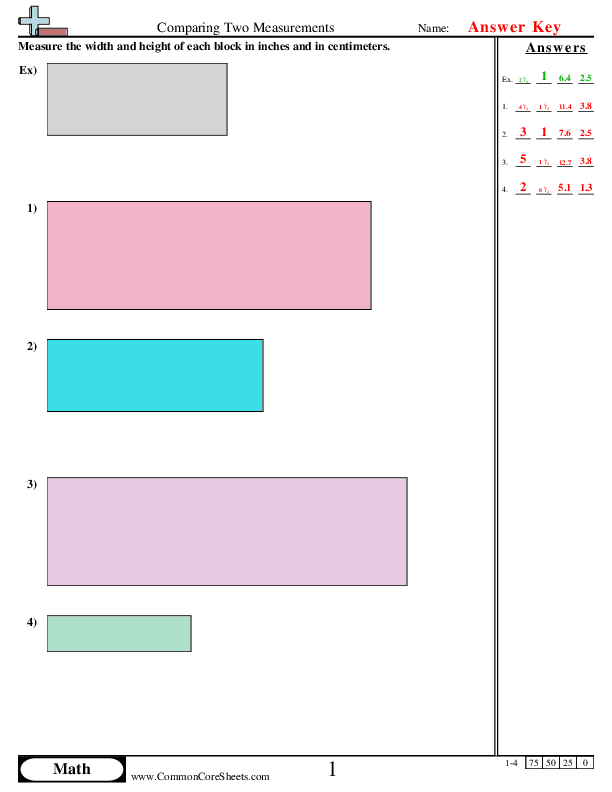Looking for the best measurement worksheets on the internet? Look no further! Our measurement worksheets are designed to help students of all ages learn and practice the important skill of measurement. From length and weight to volume and capacity, our worksheets cover a wide range of topics to ensure a well-rounded understanding of measurement concepts. And the best part? They're all free! Simply download and print as many copies as you need for your classroom or home use. These measurement worksheets are a great resource for teachers, students, and parents looking to improve their measurement skills. Try them out today and see the difference they can make in your understanding of measurement.
Browse Sheets By Problem Type
×

Comparing objects width
2md4


×
Description:
"This worksheet is designed to enhance children's math skills, focusing on comparing two measurements. It offers a challenging series of 9 problems that instill the concepts of measurement comparison. With the versatility of customization, it also allows practitioners to convert it into flashcards or integrate it into distance learning modules, promoting enjoyable math learning experiences from any location."

×
Student Goals:
Measurement UnderstandingUpon completion of the Comparing Two Measurements worksheet, students should be able to gain a robust understanding of measurements. They should be capable of distinguishing between different types of measurements, appreciating their differences, and need in real-life situations.Comparison SkillsThis problem set is designed to enhance students' comparison skills, particularly when dealing with numerical data associated with measurements. Post-completion, students will be skilled at judging which measurement is larger or smaller, thus providing them an essential skill required for mathematics and daily life.Critical thinkingOne of the paramount accomplishments of students will be the ability to develop and apply critical thinking abilities. The students will be trained to interpret and solve problems from various angles. It aims to boost their cognitive abilities and allow them to think more in-depth about the problems they are working on.Application of Mathematical ConceptsBy solving this worksheet, students will get to apply the mathematical concepts learned in class to practical problems. They would understand and learn the practical applicability of mathematical concepts and principles, thereby enhancing their ability to relate classroom theory to practical real-world scenarios.Problem-Solving skillsCompleting the worksheet will also improve the students' problem-solving skills. These skills involve not only understanding and planning how to approach a problem but also executing the plan and rechecking the solution. This practice can build their confidence and improve their performance in math tests and exams.Competence and Confidence BuildingPost-completion, students would witness a noticeable increase in their mathematical competence and overall confidence. By successfully tackling and solving unforeseen challenges and complex measurement problems, they will build tenacity and resilience, an attribute that is invaluable in every sphere of their academic and personal life.



Comparing Two Measurements (Width)
2md2


×
Description:
"This worksheet is designed to strengthen children's math skills by comparing two measurements. Featuring nine diverse problems, it encourages critical thinking and promotes math engagement. Highly customizable, it can be converted into interactive flash cards or utilized in distance-learning settings, making it equally suitable for classroom or home-based learning. A fantastic tool for young learners ready to explore complex concepts in a fun, accessible format."

×
Student Goals:
Understanding of MeasurementsBy completing this worksheet, students should enhance their understanding of measurements. They will gain a hands-on knowledge about the different units of measurements used in math and broaden their comprehension of key mathematical concepts related to measurements.Comparison SkillsStudents will have the opportunity to improve their comparison skills. They will learn to analyze and compare different measurements, identify patterns, and establish relationships between them. These skills are fundamental in developing mathematical and logical thinking.Problem-solving abilitiesThrough the nine problems provided in the worksheet, students can improve their problem-solving abilities, learning to apply comparison tools to evaluate and solve math problems. It aids in the development of their critical thinking skills, necessary to understand complex math problems in the future.Practical Application of Math ConceptsAfter completing the worksheet, students should be able to apply the math concepts in real-life scenarios effectively. They will realize the importance of measurements and comparisons in their daily lives, such as comparing lengths, weights or time. This will also bring significance to their learning process making math relevant.Increase Precision and AccuracyWorking on these problems will enable students to enhance their accuracy and precision. They need to pay meticulous attention to detail to arrive at the right solution which ultimately sharpens their focus, accuracy, and overall performance in mathematics.Boost ConfidenceSuccessfully understanding and completing the problems on the worksheet will boost the student's confidence in their mathematical abilities. This sense of achievement can motivate them to tackle more complex math problems and overall enhance their interest in the subject.



Comparing Two Measurements (Width & Height)
2md2


×
Description:
"This worksheet is designed to enhance children's mathematical understanding by comparing two measurements. It includes four engaging problems that foster analytical skills in kids. The worksheet promotes versatility: it can be easily customized to fit individual learning needs, converted into flashcards for interactive learning, or used effectively in distance learning environments. This utility ensures it's a beneficial resource supporting progressive math education for children."

×
Student Goals:
Develop Mathematical SkillsAfter completing this worksheet, students should have enhanced their math skills, particularly in comparing two measurements. They would have been given a hands-on opportunity to tackle problems that require comparison of different measures, challenging their critical thinking and decision-making abilities.Boost Problem-Solving AbilitiesThese math problems aim to expand children's problem-solving abilities. By strategically analyzing the problems presented on the worksheet, students would develop their ability to examine, break down, and solve complex maths problems, a skill that extends beyond the classroom and is valuable in daily life.Enhance Interpretation SkillsBy engaging with this worksheet, students will fine-tune their interpretation skills. Comparing two measurements involves interpreting and understanding each measurement first before a comparison can be made. This could improve their overall narrative comprehension abilities and even enhance their aptitude in the sciences and other related subjects.Familiarity with Different Units of MeasurementArising from the completion of the worksheet, students should be more comfortable with different units of measurement. This bolsters their flexibility in dealing with different measurement units, making it easier for them to grasp more intricate measurement-related concepts in higher levels of mathematics.Promote Logical ReasoningThrough these problems, kids would have practiced and improved logical reasoning. The exercise of comparing measurements stretches the student's ability to reason logically, which is critical not only in mathematics but in many facets of learning and everyday decision-making.Increase Confidence in Math AbilityAs the students work through each problem with increasing familiarity and skills, they would build their confidence in handling math problems. This confidence boost can lead to better performance in upcoming math tasks and assessments, fostering a genuine interest and steady progress in their mathematical journey.



Word Measurement Estimating
2md3


×
Description:
"This worksheet is designed to improve children's math skills, specifically in measurement estimation. Through 20 varied problems, the children are challenged to estimate the dimensions of common objects like a textbook, soup can, or football field. Adaptable to a child's individual needs, the worksheet can be customized, converted into flash cards, or used for distance learning activities, making it a versatile resource for enhancing their understanding of measurements in an engaging and tangible way."

×
Student Goals:
EstimationStudents will develop their estimation skills, crucial in everyday mathematics and problem-solving. They will learn to make reasonable guesses about an object's dimensions without actual measurement, building their sense of spatial awareness and magnitude.Appreciation of Units of MeasurementUpon completion of the worksheet, students will have a refined understanding of different units of measurement. They will comprehend the relevance of different measurement units like centimeters, inches, meters, or feet and their application to real-world objects. This sectional work can construct foundational knowledge required for learning more advanced measurement concepts.Application of Mathematical KnowledgeStudents will gain the ability to apply their mathematical knowledge to everyday objects, linking theoretical math concepts with real-world applications. This can aid in fostering a significant comprehension of math, viewing it as a practical and useful subject rather than abstract theory.Comparison AbilitiesThe worksheet will enable students to develop their comparison abilities. By understanding the relative lengths and heights of various objects, they can conceptualize the comparative sizes of different objects, leading to better spatial-reasoning skills.Critical ThinkingCompleting the measurement estimating worksheet can help students hone their critical thinking skills. They will have to rely on both their math knowledge and logical thinking to determine the most reasonable unit to measure different items.Development of Cognitive SkillsDrawing estimates encourages children to observe closely and attentively, fostering sharpens observation, visualization, and mental agility. This activity will serve to stimulate their cognitive development, enhancing mental calculation, decision-making ability, and improving concentration.





